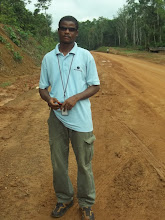-Taylor faces second trial
By P. Alphonsus Zeon in The Hague
Liberia’s former President Charles Taylor faces the prospect of another trial if at all he gets away as a free man in his current war crimes trial before the Special Court for Sierra Leone in The Hague.
The former Chief Prosecutor of the Special Court who indicted Taylor had in fact called for another hybrid war crimes court for Liberia long before Taylor`s March 29, 2006 arrest at the Roberts International Airport.
In the February 8, 2006 submission to the Sub-committee on Africa Global Human Rights and International Operations, a committee of the International Relations, US House of Representatives, Mr. Crane said the conflict in Sierra Leone was far different from the Conflict in Liberia and that ‘another hybrid war crimes tribunal needs to be established to account for the war crimes and crimes against humanity committed by Charles Taylor and his henchmen from 1990 to 2003 in Liberia.’
He said Liberia, working together with the international community and under the auspices of the United Nations can account for what Charles Taylor did to his own countrymen.
Crane told the US lawmakers, ‘Charles Taylor has destroyed two nations, not just one.
He must be prosecuted for any crimes he is alleged to have committed in Liberia after he is tried for what he did in Sierra Leone.’ He said Taylor ‘is individually criminally responsible for the destruction of 1.2 million human beings.’ Crane warned that Taylor still poses a threat to Liberia and the region.
‘He is relatively young, wealthy, influential and has a supportive base, military and politically, within Liberia and the Mano River region.
Crane`s call for a second Taylor trial is contained in his ‘suggested roadmap for a successful beginning for Liberia.’
‘First, hand Charles Taylor over to the Special Court for Sierra Leone for a fair trial. This takes him out of the local and regional dynamic that is West Africa. The new President can move forward, confident that Charles Taylor is not lurking in the shadows undermining her initial efforts to develop a legitimate and accountable government in Monrovia.
Second, tie any financial and political support to good governance in Liberia.
Third, encourage the new administration in Liberia to establish the Truth and Reconciliation Commission called for in the earlier peace accords.
Fourth, within the next few years or so, another hybrid war crimes tribunal needs to be established to account for the war crimes and crimes against humanity committed by Charles Taylor and his henchmen from 1990 to 2003 in Liberia.’
Three of Crane`s suggested roadmap for Liberia had taken place in the country, except a court.
A local group, the Movement for the Establishment of a war crimes court has been campaigning since. But its efforts are hitting rock. Former UN Secretary General, Kofi Annan who received the group’s first petition for a court, asked the group to in fact petition its government. Many believe this is a sure way to kill the whole idea. Many in government who should make a formal request for the establishment of the court are potential indictees. It follows then that no one would want to indict himself by calling for a court in Liberia.
Even findings from the country’s Truth and Reconciliation Commission, including a provision, calling on President Ellen Johnson Sirleaf to stay away from public office for 30 years are facing resistance from government circles.
Taylor`s lawyer, Courtney Griffiths refers to Crane`s suggestion for a second trial for Taylor as a second opportunity to get Taylor if the prosecution fails to link him to the crimes in Sierra Leone. ‘So we will throw out - you get your pick. "If we miss him in the Sierra Leonean court, I will try to get him in Liberia."
Taylor said that was the whole point, ‘ they may as well just shoot me,’ he said as he hauls up to his shoulders the ends of his white African gown while resting his elbows on the desk behind which he sat. ‘That’s the whole construct, ‘banging on the desk in the court room.
Dr J. Peter Pham, Director, William R Nelson Institute for International and Public Affairs, James Madison University said ‘Liberia, while small in population and without any hydrocarbon reserves discovered to date, is in many ways the key to the entire sub-region. If Liberia remains stable, the fragile peace in Sierra Leone will be reinforced, the conflict in Cote d'Ivoire will be contained and collapse of Guinea mitigated. A democratic Liberia - and the Liberian people want it to be such - will be a beacon for the entire sub-region.’
Dr. Pham said Taylor’s invasion of Liberia, the initial conflict in Liberia made the outbreak of conflict in the neighboring states inevitable.
Thursday, November 19, 2009
Subscribe to:
Post Comments (Atom)

No comments:
Post a Comment